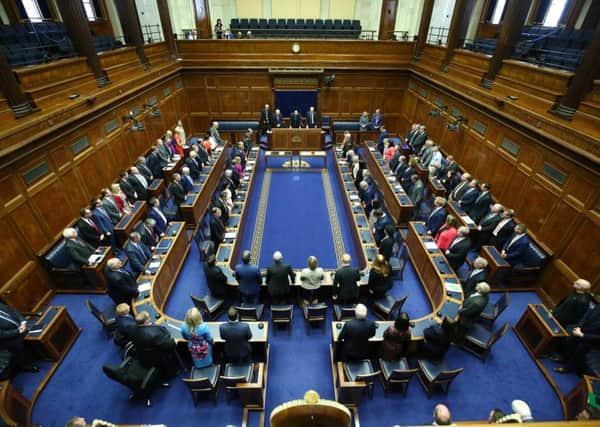Sam McBride: Poll findings blunt SF's hopes '“ and stabilise Stormont


As such, the poll could be one of the most stabilising influences on Stormont after a summer of uncertainty which followed the immediate post-Brexit hysteria.
This poll may persuade Sinn Fein that there are more votes in making Stormont work than there are in attempting to block Brexit.
Advertisement
Hide AdAdvertisement
Hide AdThe Ipsos MORI research is the first serious evidence to counter the widespread anecdotal evidence that a section of the populace was rethinking its identity in the wake of the shock referendum result.
The poll was carried out last month, by which point some of the initial fears in the days following June 23 had been discounted.
It could be that some of those most shaken by the result have now reconciled themselves to the new reality – particularly as some of the wildest fears have not been realised.
Although small at just five percentage points, the increase in support for a united Ireland since the last Ipsos MORI poll for The View three years ago is clear.
Advertisement
Hide AdAdvertisement
Hide AdHowever, that could be as much to do with the marked improvement in the southern economy since then as it is to do with the EU question.
Even if the entirety of that increase is down to Brexit, it is not the evidence of a mass public backlash for which republicans would have hoped.
Martin McGuinness had argued that Sinn Fein’s case for a border poll was “strengthened” by the outcome of the EU referendum.
But on The View on Thursday night, Sinn Fein chairman Declan Kearney found it difficult to spin the poll results as a positive.
Advertisement
Hide AdAdvertisement
Hide AdHe accurately said that “there’s a huge amount of uncertainty across northern society at this point in time”. But it is for that very reason that – 15 years after Sinn Fein became the largest nationalist party – the failure of Sinn Fein to convince the public of the need for a united Ireland ought to be so troubling for republicans.
Implicit in Declan Kearney’s plea for a debate on a united Ireland to “begin” is an admission that Sinn Fein has failed to start that debate.
And it suggests that others should start to ponder the possibility of removing the border. For all its electoral success, when Sinn Fein is reduced to begging others to start talking about how it can achieve its primary goal, the party has a fundamental problem.
All is not bleak for nationalism – this poll shows a slight increase in support for a united Ireland and Sinn Fein is almost peerless at electioneering, something which will give it an advantage if a border poll is ever called.
Advertisement
Hide AdAdvertisement
Hide AdIt is also the case that across the globe political certainties have – overnight – been rejected, with electorates from Greece to America showing themselves open to being persuaded in a short space of time to defy conventional political wisdom and embrace radical change.
After this poll, Sinn Fein faces a choice: Does it continue with its virulently anti-Brexit stance even though this evidence suggests that there are limited votes for a united Ireland in such a stance?
Or does a party which has historically been fiercely Eurosceptic return to that stance and instead argue for Ireland to be reunited outside the EU?